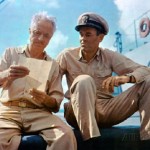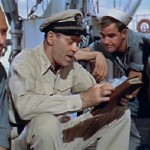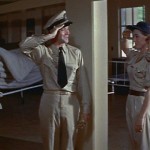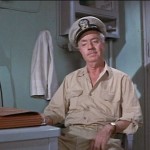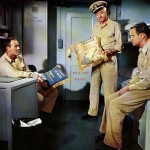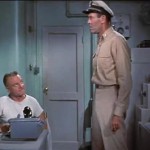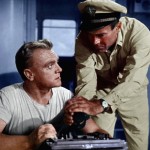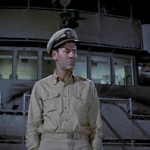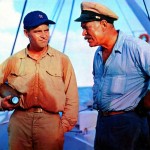
Mister Roberts – 1955
I’ve seen this film before. The first time, it was called Mutiny on the Bounty. The second time, it was called The Cain Mutiny. This time it was called Mister Roberts, but it had a twist. There was no actual mutiny. This time, James Cagney’s Captain Morton joins Captain Bligh, and Captain Queeg, as the ridiculously tyrannical captain of a navy vessel. He is mean, paranoid, and utterly unreasonable, just like the rest.
The leader of the oppressed crew is Lieutenant, Jr. Grade, Doug Roberts, played by Henry Fonda. He is a good man who is close with the sailors under his command, going out of his way to protect them from the raving tirades of Captain Morton. It is a story that has been told many times before and it’s starting to get old. Hollywood, I’m talking to you! One would think that all naval Captains are sadistic bastards.
Well, that being said, I have mixed feelings about the film, as a whole. I liked the film’s ending, but I didn’t like the moronic antics of the movie’s middle. So, I’ll start with that. I understand that sailors have a reputation of being rude, crass, Neanderthals that are rough and tough. But these characters behaved like Tex Avery cartoon characters.
Sure, the men are forced to work in grueling conditions, and the evil Captain Morton has not given them any shore leave for more than a year, but they do not have to turn into panting, slobbering, retarded, caricatures when they see a woman. Then, when Mr. Roberts makes a shady deal with the Captain so that they can finally have their shore leave, they do not have to become criminals who are violent drunkards, destroying property, molesting women, and terrorizing the port town. They are so bad that they are actually kicked off the island. And to make it even more unbelievable, Mr. Roberts actually laughs it all off as “guys just being guys.” Seriously? The real U.S. Navy wouldn’t stand for that kind of behavior and the men involved would be severely disciplined.
But the tragic ending was actually good. Mr. Roberts was stuck on a cargo ship while there was a war going on that he believed in. He wanted to be a part of the fight, wanted to make a difference. At least, that was the way he was portrayed. In the end, he gets his wish. The crew forges the Captain’s signature so that Mr. Roberts gets transferred to a Destroyer in Okinowa. While there, he is killed in action. That much, at least, was realistic enough.
I also have to mention the two other big names that were in the film. William Powel played the part of Doc, the voice of reason and understanding. This was actually Powel’s final film appearance. He, as always, did a great job, and stood out to me as one of the better parts of the film. He was like the wise sage that comforts Mr. Roberts when he is feeling like he can’t take any more of being the Captain’s whipping boy.
The other was Jack Lemmon, playing the part of Ensign Pulver. He was the comic relief of the movie, going out of his way to have romantic encounters with any woman within reach. Lemmon won the Academy Award for Best Supporting Actor for his role in the film, and I’m guessing that it was mostly because of the last few minutes, after the crew learned of Mr. Robert’s death. His comical character turned serious and he stopped being funny.
Fonda did a good enough job, though his part wasn’t that dynamic. There were only a few times when any strong emotion rose to the surface, which wasn’t necessarily a bad thing. The emotion was generally there, but played very subtly. The scene in which he throws that Captain’s palm tree overboard was nicely done, as was the big fight with Captain Morton, in which the secret deal was made.
And as for Cagney… well, I don’t have much to say about him. His character was very one-note. He was an angry tyrant and that was about it. The character had no redeeming qualities preventing the actor from displaying any emotion except rage. But I don’t blame Cagney for that. I blame the script. Apparently, Fonda, who had played the role of Mr. Roberts on Broadway, said that though the film was still good, the stage play script was better.
